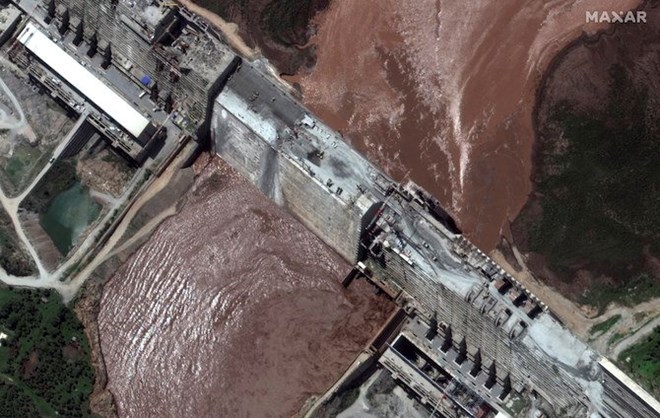
Monday July 27, 2020

This handout satellite image obtained courtesy of Maxar Technologies on July 21, 2020 shows a view of northwestern Ethiopia that focuses on the status of the Grand Ethiopian Renaissance Dam (GERD) and the Blue Nile River on July 11, 2020. (Handout/Satellite image ©2020 Maxar Technologies/AFP)
CAIRO: Sudan wants a decisive round of negotiations on the Renaissance Dam with Egypt and Ethiopia, provided the latter adheres to a timetable and agenda to address disagreements, Sudanese Minister of Water and Irrigation Yasser Abbas said on Sunday.
The minister added that Addis Ababa must also negotiate without raising issues beyond the scope of the dam and future projects.
Abbas said an African Union (AU) statement on the Renaissance Dam meetings is in line with Sudan’s proposals on the need to reach a fair and binding agreement on filling and operating the dam and other future projects.
The AU confirmed it is preparing for a new round of talks on the dam. It has invited Egypt, Sudan and Ethiopia to work on reaching an agreement.
Egypt, which relies on the Nile for 95 percent of its fresh water, fears the dam will significantly reduce the river’s flow, especially during its filling through periods of drought or in dry years. Ethiopia has said the project is key to its energy development.Sudan, as a downstream country, also fears the dam will affect its water supply.
Ahmed Hafez, spokesman for the Egyptian Ministry of Foreign Affairs, said that the AU summit on the dam last Tuesday highlighted the need to reach an agreement that will include a mechanism to settle disputes.
The Khartoum State Water Authority announced a sudden rise in the level of the Nile, which led to a decrease in the production of clean water, especially in marine water purification stations. It suggests that work is underway to raise water platforms in the stations.
Anwar Al-Sadat Al-Haj Muhammad, the authority’s director-general, said turbidity in the water increased from 3,000 to 14,000 units, reducing the production of clean water in all stations in the state. The North Khartoum and East Khartoum neighborhoods were most affected.
“The historic achievement of the first stage of filling the Renaissance Dam is a testament to the end of the unfair use of the Nile,” the Ethiopian News Agency reported Deputy Prime Minister of Ethiopia Demeke Mekonnen as saying.
In a speech to a meeting to coordinate public participation in construction of the dam, Mekonnen said the completion of the first stage of filling the dam puts an end to the unfair use of the Nile, which has “continued for a long time.” He referred to the 1959 agreement between Egypt and Sudan that, 60 years after its application, “resulted in Ethiopia suffering.”
During the presentation of the report, Ethiopia’s Minister of Water, Irrigation and Energy Seleshi Bekele said Ethiopia uses less than 10 percent of the 15,000 gigawatt hours the dam is capable of producing from Nile water.
He added that electricity generation from water will be ready in February and April 2021, through two turbines. A further 11 new turbines will be also be installed.
Gamal Hilal, former adviser to the White House, told the Egyptian press that the US has not abandoned mediation in the dam dispute, with US Treasury Secretary Steven Mnuchin playing a mediating role.
Hilal said Mnuchin’s biggest concern other than the coronavirus pandemic is the process to steady the US economy on behalf of US President Donald Trump and Congress.
“These matters are Mnuchin’s responsibility,” Hilal said.
“All his efforts are focused on saving the economy and negotiating to approve new deals. It is difficult for anyone to imagine that Mnuchin will leave his president and economy, and focus on the Renaissance Dam.”
Hilal said the US position will be neutral, but if Egyptian diplomacy succeeds in making the US ministry of foreign affairs and the treasury make statements in favor of Egypt, then it will be a good step, even if Mnuchin has no time to enter negotiations himself.
“I do not separate the risks of the dam and the risks of the Turkish presence in Libya, because both are an existential threat to Egypt and neither is more important than the other,” Hilal added.